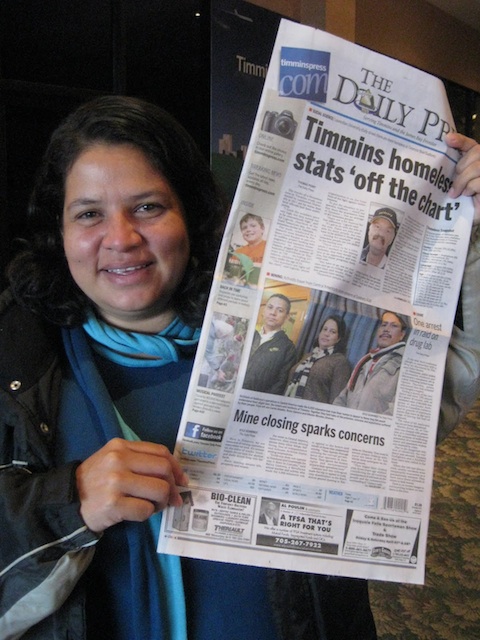"Goldcorp has reaped the benefits of our communities and land while we have reaped the bitter consequences,” said Reina Gamero, a teacher and member of the Siria Valley Environmental Committee in Honduras to The Daily Press in Timmins. “We would like more than anything, to see the company compensate our community and help us re-establish our lives, our homes, and our well being.”
This year, the Coalition Against Unjust Mining in Guatemala (CAMIGUA) set the agenda of Goldcorp’s Annual General Meeting to focus on closure costs and mine reclamation. With guests from Honduras and Guatemala, a delegation including representation from MiningWatch, Amnesty International, the Unitarian Universalist Service Committee (UUSC), the Network in Support of the People of Guatemala, and the Center for International Environmental Law travelled all the way to Timmins for the meeting.
Held on April 26th in the cafeteria of the Northern College of Applied Arts and Technology in South Porcupine, Ontario, near the city of Timmins, which is celebrating its centenary year this year, Rob Robinson, a mine and environmental engineer, presented a shareholder resolution to the company on behalf of UUSC as one of the co-filers. The resolution asked the company to put down an independently guaranteed surety bond for the Marlin mine in Guatemala commensurate with estimated closure costs of $49 million. Robinson helped carry out a review in 2011 of publicly available information on mine closure plans for the Marlin mine to arrive at the $49 million figure. Goldcorp’s current surety bond for the Marlin mine is only $1 million USD. The resolution also asked for the company to disclose a comprehensive account of its closure plans for the mine and to consult with affected communities about these plans, consistent with recommendations from the company’s own Human Rights Assessment of the Marlin mine published in May 2010.
Tara Scurr, Business and Human Rights Campaigner for Amnesty International, highlighted at the meeting that over 5,000 people signed an online petition in support of the resolution and that the company should step up to the plate to respect the rights of affected communities. A recently published cost-benefit study of the Marlin mine found that if the company continues with business as usual that long term risks to communities will result in further impoverishment for the eighteen indigenous Maya Mam communities living in the area.
Alfonso Morales Jiménez of the Departmental Assembly of Huehuetenango in Guatemala noted that experiences with Goldcorp’s Marlin mine have spurred some sixty municipalities in neighbouring parts of the country to hold local votes on mining activities. The results have been that a vast majority of people have voted against metal mining as a preventative measure against future approval of licences. “Even though the government refuses to acknowledge these referendums,” he told the local press, “we see them as binding.”
Reina Gamero and Carlos Amador from the Siria Valley Environmental Committee in Honduras testified to what poor closure plans look like based on their experiences with the company’s San Martín mine in Honduras, where acid mine drainage has already been identified and where communities have raised alarm about public health problems emerging since the mine first went into operation in 2000. The mine began to close in 2008. Gamero and Amador were upset, however, to hear Goldcorp CEO Charles Jeannes make light of their problems, saying that the company had built an ecolodge near the site and that he had personally eaten tilapia out of an old reclaimed tailings pond near the San Martín mine, suggesting that their concerns are unfounded.
In response to Jeannes’ remarks in the local press, Gamero and Amador wrote a letter to the editor of the Timmins Daily Press, in which they said: “Insinuating that a few tilapia ponds and an ecotourism hotel serve as some sort of consolation for a problem that could continue to contaminate our water and soil for centuries seems to us to be a display of Goldcorp’s arrogance made possible in the context of a justice system that works in the interests of companies not communities.” The letter was published on May 11th.
During the meeting, company management also responded to the shareholder resolution, making a verbal commitment that “Guatemalans should not bear the costs of closure” and that it would work with the Guatemalan government to raise the surety bond for the Marlin mine as high as its own estimated costs for mine closure – currently at about $27 million USD. The company also made promises to consult and ensure closure plans exist for all its mine sites.
CAMIGUA is still reviewing these results with our partners in Guatemala and Honduras to best determine how to hold the company to these promises. The company’s estimated costs of $27 million are believed to be an underestimate, based on publicly available information about its closure plans so far, and it will be a challenge to ensure that consultation over closure plans is meaningful. Nonetheless, there is no doubt that CAMIGUA and its partners managed to raise the profile of an important issue: the need to internalize the costs of mining operations that will have long term ramifications for affected communities and that, despite previous recommendations, the company would otherwise continue to ignore.








